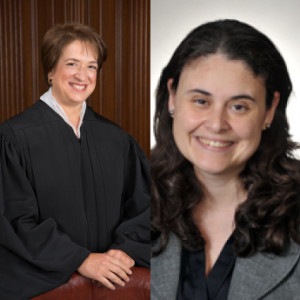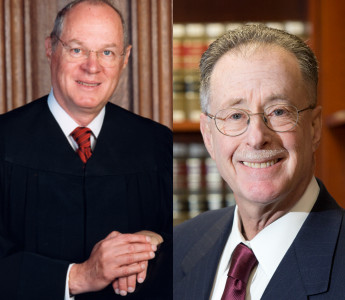Puerto Rico v. Sanchez Valle, 579 U.S. ___ (2016) (Kagan, J.).
Response by Rosa Celorio
Geo. Wash. L. Rev. On the Docket (Oct. Term 2015)
Slip Opinion | Bloomberg | SCOTUSblog
Insights on the Dual Sovereignty Doctrine, Double Jeopardy, and the Status of Puerto Rico
On June 9, 2016, the Supreme Court of the United States issued its decision in the case of Commonwealth of Puerto Rico v. Sanchez Valle,1 concerning the applicability of the dual sovereignty doctrine to United States territories in double jeopardy cases. In essence, the specific legal question the Court examined in Puerto Rico v. Sanchez Valle was whether under the dual sovereignty doctrine, Puerto Rico and the United States could successively prosecute the respondents for the same criminal conduct. The Court analyzed, in particular, whether the local criminal system in Puerto Rico could still prosecute respondents Luis Sanchez Valle and Jaime Gomez Vasquez for the illegal sale of firearms, when they had already pleaded guilty to equivalent federal criminal charges. Both respondents were indicted first under the criminal laws in Puerto Rico and later under federal law.
As background, the U.S. Supreme Court has long upheld the protection against double jeopardy contained in the Fifth Amendment of the U.S. Constitution,2 but also established that successive prosecutions may occur in cases brought by different sovereigns in matters related to equivalent conduct and laws.3 The Supreme Court of Puerto Rico had decided concretely that, under these circumstances, the gun sale prosecutions in Puerto Rico violated the double jeopardy clause of the U.S. Constitution, despite the existence of a local criminal system in Puerto Rico.4 The majority of the Puerto Rico Supreme Court considered that under the dual sovereignty doctrine, the crucial factor to examine whether Puerto Rico is sovereign in this sphere is the origins of its faculty to prosecute.5 The Puerto Rico Supreme Court construed the power as originating from the United States Congress, thereby concluding that Puerto Rico could not be considered a separate sovereign for this purpose. It is noteworthy that three judges differed from the majority on this point, contending that the Commonwealth of Puerto Rico and the United States are separate sovereigns.6 In its petition for writ of certiorari, the Commonwealth of Puerto Rico claimed that the Puerto Rico Supreme Court “adopt[ed] a narrow and wooden interpretation of sovereignty” and that recognizing both federal and Puerto Rico sovereignty in this matter was legally sound.7
The U.S. Supreme Court in its Sanchez Valle ruling affirmed the reasoning advanced by the Puerto Rico Supreme Court, concluding that the double jeopardy clause bars Puerto Rico and the United States from successively prosecuting persons for similar conduct under equivalent criminal laws.8 In a decision authored by Justice Kagan, the Court concluded that the “oldest roots of Puerto Rico’s power to prosecute lie in federal soil.”9 Since the onset of the judgment, the Court indicated that the question it is seeking to answer is one related to the source of the prosecutorial power of the Puerto Rican jurisdiction to determine whether it could be considered to have an independent origin. To answer this question, the Court presents a detailed analysis of its understanding of the relationship between Puerto Rico and the United States, including key moments in the consolidation of the self-governance structures in the island. The Court refers in particular to the climactic adoption of Public Law 60010 by Congress enabling Puerto Rico to adopt its own constitution, leading to the creation in 1952 of the Commonwealth of Puerto Rico, or what is better known today as the Estado Libre Asociado (“ELA”). Justice Kagan underscores that “in the ensuing hundred-plus years, the United States and Puerto Rico have forged a unique political relationship, built on the island’s evolution into a constitutional democracy exercising local self rule.”11
Using this history as a backdrop, the decision advances important principles concerning the dual sovereignty component of the double jeopardy clause and its applicability in cases concerning United States territories. The U.S. Supreme Court reiterates its jurisprudence concerning the dual sovereignty doctrine, but further refines its understanding of the word “sovereignty” when examined in double jeopardy cases relevant to U.S. territories. For the Court, the degree to which an entity or territory enforces “self-governance,” “autonomy,” or “control” over its own affairs is not relevant to the analysis, even when granted by means of congressional action.12 The ability to enact and enforce criminal laws is also irrelevant. The Court determined that its test solely looks at the “ultimate source” of the power to prosecute, and whether this source is independent or distinct.13 The states of the Union and Indian tribes meet this test because they had “inherent” powers before the formation of the United States, and therefore, the source is not the federal government.14 Despite recognizing that Puerto Rico “has a distinctive, indeed exceptional, status as a self-governing Commonwealth,” the Court adopts what it calls a “historical approach” considering decisive that the U.S. Congress was the one which granted Puerto Rico with the authority to adopt its own constitution, including the ability to bring criminal charges.15
The dissent authored by Justice Breyer, and significantly joined by Justice Sonia Sotomayor who is of Puerto Rican descent, seems to advance a different test which should be employed to determine whether Puerto Rico is sovereign for the purposes of double jeopardy.16 Justice Breyer presents a very thorough analysis indicating that recent congressional action and historical circumstances should have a bearing on the question of where the source for prosecutorial authority originates, examining closely the history behind the adoption of Public Law 600 by Congress and its grant of extended self-governing capacity to Puerto Rico. The dissent also argues that the consistent actions and practices of the U.S. Congress and the different branches of the U.S. government recognizing the autonomy of the governance structures and laws of Puerto Rico should have significance as well.
The U.S. Supreme Court judgment in Sanchez Valle is noteworthy for a number of reasons. In this ruling, the Court advances a protective approach to civil and human rights by limiting the scope of the dual sovereignty doctrine for double jeopardy purposes. The protection against double jeopardy is a cornerstone constitutional right codified in the Fifth Amendment, and a paramount internationally recognized human right contained in the International Covenant on Civil and Political Rights,17 which the United States has ratified. Even though the U.S. Supreme Court decision does not refer to the international law component of the prohibition of double jeopardy, it does serve to advance current international law standards. The human dignity and rights dimension of this case was alluded to in the concurring opinion by Justice Ginsburg and Justice Thomas.18 Their concurring opinion might provoke useful and necessary future discussion of the civil rights and human rights repercussions of the dual sovereignty doctrine for double jeopardy purposes.
However, what this decision might be most remembered for is its discussion concerning the limits and contours of the existing governance capacity of U.S. territories, and the situation of Puerto Rico in particular. For the U.S. Supreme Court, there is a significant difference between the faculties of self-governance structures in U.S. territories, and the principle of sovereignty for double jeopardy purposes. As referred to by the Court, Puerto Rico has a very-developed governance structure, including its own constitution and executive, legislative, and judicial branches, largely stemming from the creation of the ELA in 1952. There has been since significant and ongoing debate in the island regarding the question of whether Puerto Rico ceased to be a U.S. territory after the creation of the ELA in 1952 and what its current political status is and should be in the future. The majority of the U.S. Supreme Court in Sanchez Valle appears to confirm that Puerto Rico is still a U.S. territory, with a political status which is inherently different from the states which form part of the Union, irrespective of its extended self-governance capacity, autonomy, and structures.19
This analysis is of particular relevance to Puerto Rico at this moment, since it is undergoing a very public economic debt crisis, and there is extensive debate in the island over what kind of incidence its citizens will have in repairing its economy and determining their political future. It is a major issue of debate by the political candidates seeking the governorship of the island on the eve of the November 2016 elections. The island has also had increased coverage this year in the United States and by the three branches of the U.S. government, including the June 9, 2016 passage of a bill by the U.S. House of Representatives which would create a financial control board that could help restructure Puerto Rico’s debt payments,20 the address offered by President Barack Obama on the economic situation of the island on June 11, 2016,21 and the June 13, 2016 U.S. Supreme Court Judgment in case of Commonwealth of Puerto Rico v. Franklin California Tax-Free Trust22 curbing again the reach of local efforts to address the fiscal crisis. Claims of human rights violations occurring in the island and those inherent to the United States and Puerto Rico’s relationship have also been brought forth by several former politicians and organizations before international human rights monitoring bodies and are pending resolution.23 This is also an issue that the United Nations has picked up—an inter-governmental organization widely referred to by Justice Breyer in his dissent—and framed in terms of the right to self-determination of the inhabitants of the island to have a voice in determining their future status.24
Puerto Rico is evidently at a defining moment in its political, economic, and social history, which makes this U.S. Supreme Court decision very important, timely, and consequential. Even though the U.S. Supreme Court judgment in Sanchez Valle could be narrowly construed as just applying to double jeopardy cases, given the distinct definition the Court advances of “sovereignty” in these matters, the current circumstances of Puerto Rico and the recent pronouncements by the three branches of the United States government weigh in favor of a broader interpretation of the scope and reach of this ruling. Regardless of the prevailing and divisive views concerning how Puerto Rico’s status should be resolved, the Court in Sanchez Valle adds paramount clarity and key analysis in a moment of need for the island. The Court’s ruling will also be an important element for federal authorities which are examining questions concerning Puerto Rico, and for the local governance structures in Puerto Rico. It remains to be seen what kind of impact this U.S. Supreme Court decision will in reality have in future discussions concerning the economic and political status of Puerto Rico, but the author esteems it promises to be a considerable one.
- Commonwealth of Puerto Rico v. Sanchez Valle et al., No. 15-108, slip op. (U.S. June 9, 2016).
- U.S. Const. amend. V.
- United States v. Lanza, 260 U.S. 377, 382 (1922); Heath v. Alabama, 474 U.S. 82, 88 (1985).
- El Pueblo de Puerto Rico, Recurrido v. Luis Sanchez Valle, Jaime Gomez Vasquez y otros, 2015 TSPR 25, 192 D.P.R. 594 (P.R. 2015).
- See id. at 641–47.
- See id. at 648–727 (Fiol Matta, C.J. and Oronoz Rodríguez, J., concurring); id. at 727–61 (Rodríguez Rodríguez, J., dissenting).
- Petition for Writ of Certiorari at 27, Puerto Rico v. Sanchez Valle, No. 15-108, slip op. (U.S. June 9, 2016).
- Commonwealth of Puerto Rico v. Sanchez Valle et al., No. 15-108, slip op. at 5 (U.S. June 9, 2016).
- Id. at 2.
- Act of July 3, 1950, § 1, Pub. L. No. 81-600, 64 Stat. 319.
- Sanchez Valle, slip op. at 2.
- See id. at 6.
- See id. at 7.
- See id. at 8, 10.
- See id. at 16.
- Sanchez Valle, slip op. at 1 (Breyer, J., dissenting)
- International Covenant on Civil and Political Rights [hereinafter ICCPR] art. 14(7), 26, Dec. 16, 1966, 999 U.N.T.S. 171. When ratifying the ICCPR, the United States entered the following understanding regarding the prohibition of double jeopardy in the ICCPR: “The United States understands the prohibition upon double jeopardy in paragraph 7 to apply only when the judgment of acquittal has been rendered by a court of the same governmental unit, whether the Federal Government or a constituent unit, as is seeking a new trial for the same cause.” Id.; see also U.N. Human Rights Committee, General Comment No. 32, Article 14: Right to Equality Before Courts and Tribunals and to a Fair Trial, ¶¶ 54-57, CCPR/C/GC/32 (Aug. 23, 2007).
- Sanchez Valle, slip op. at 1 (Ginsburg, J., concurring).
- Regarding this thought, the author considers significant that the U.S. Supreme Court in Puerto Rico v. Sanchez Valle relies in part on cases it decided in the early 20th century regarding the different Constitutional statuses and rights held by U.S. territories. These are commonly referred to as the “insular cases.” See Juan R. Torruella, Ruling America’s Colonies: The Insular Cases 32 Yale L. & Pol’y Rev. 57 (2013). For more discussion, see, e.g., id.; Christina Duffy Burnett, United States: Territorial Expansion and Territorial Deannexation, 72 U. Chi. L. Rev. 797 (2005).
- See Puerto Rico Oversight, Management, and Economic Stability Act (“PROMESA”), H.R. 5278, 114th Cong. (2016), https://www.congress.gov/bill/114th-congress/house-bill/5278/text.
- See The White House, Office of the Press Secretary, Weekly Address: Addressing Puerto Rico’s Economic Crisis, (June 11, 2016), https://www.whitehouse.gov/the-press-office/2016/06/11/weekly-address-addressing-puerto-ricos-economic-crisis.
- Commonwealth of Puerto Rico v. Franklin California Tax-Free Trust et al., No. 15-323, slip. op. (U.S. June 13, 2016).
- Inter-American Commission on Human Rights, Thematic Hearing, Public Debt, Fiscal Policy, and Poverty in Puerto Rico, United States, 157th Period of Sessions, (Apr. 4, 2016), http://www.oas.org
/es/cidh/audiencias/Hearings.aspx?Lang=en&Session=142 (also available on Youtube under title “Puerto Rico: Deuda pública y pobreza”); Inter-American Commission on Human Rights, Thematic Hearing, General Human Rights Situation in Puerto Rico, United States, 154th Period of Sessions, (Mar. 16, 2015), http://www.oas.org/es/cidh/audiencias/Hearings.aspx?Lang=en&Session=137 (also available on Youtube under title “Puerto Rico: Situatión DDHH”). - See José A. Delgado, Puerto Rico’s Case before the UN, El Nuevo Día (June 20, 2016, 7:36 AM), http://www.elnuevodia.com/english/english/nota/puertoricoscasebeforetheun-2212546/; Press Release, Gen. Assembly Special Comm. on Decolonization, Crippling Trade Policies, Brain Drain, Sluggish Economy Constrain Puerto Rico’s Progress, Petitioners Tell Decolonization Committee as Session Resumes, U.N. Press Release GA/COL/3281 (June 22, 2015), http://www.un.org/press/en/2015/gacol3281.doc.htm; Press Release, Gen. Assembly Special Comm. on Decolonization, Special Committee on Decolonization Approves Text Supporting Puerto Rico’s ‘Inalienable Right to Self-Determination’, U.N. Press Release GA/COL/3269 (June 23, 2014), http://www.un.org/press/en/2014/gacol3269.doc.htm.
Recommended Citation:
Rosa Celorio, Response, Puerto Rico v. Sanchez Valle: Insights on the Dual Sovereignty Doctrine, Double Jeopardy, and the Status of Puerto Rico, Geo. Wash. L. Rev. On the Docket (June 21, 2016), http://www.gwlr.org/puerto-rico-v-sanchez-valle-insights-on-the-dual-sovereignty-doctrine-double-jeopardy-and-the-status-of-puerto-rico.





